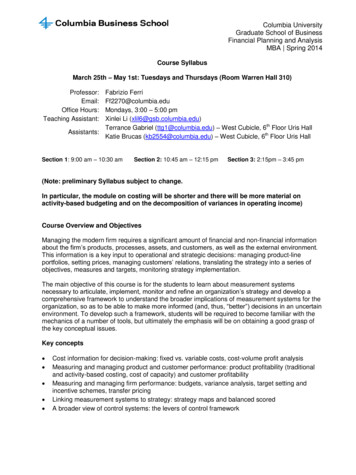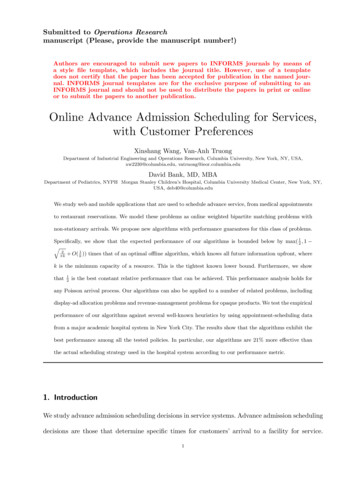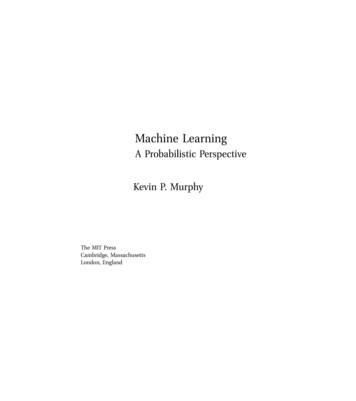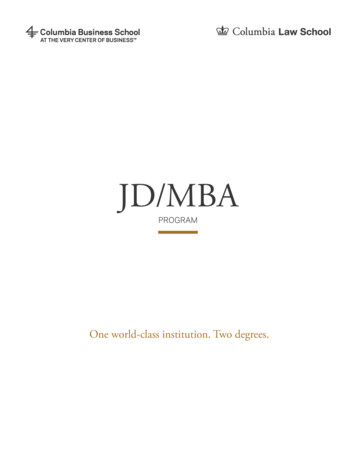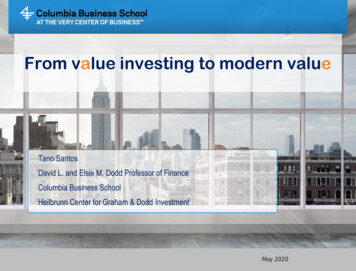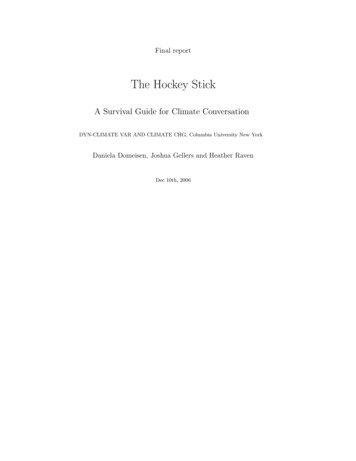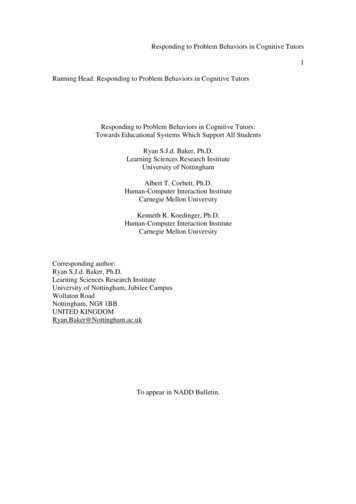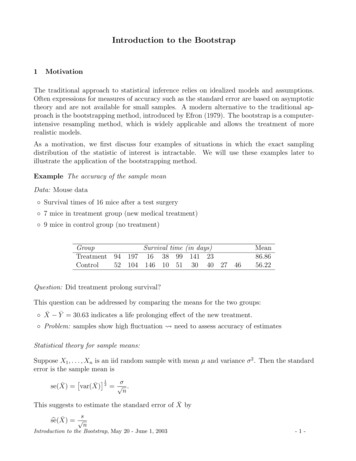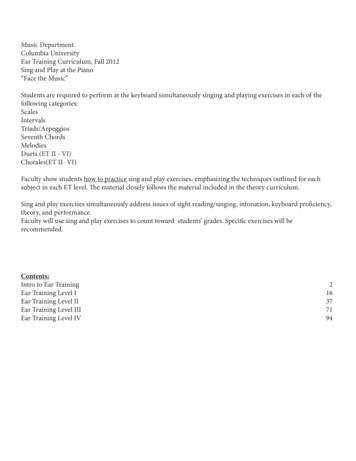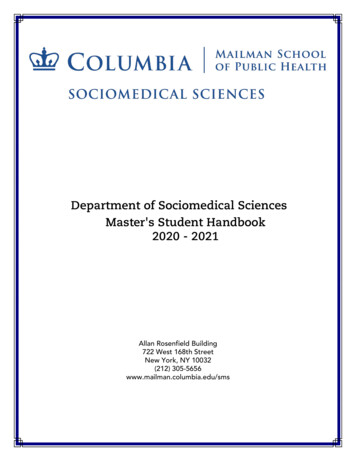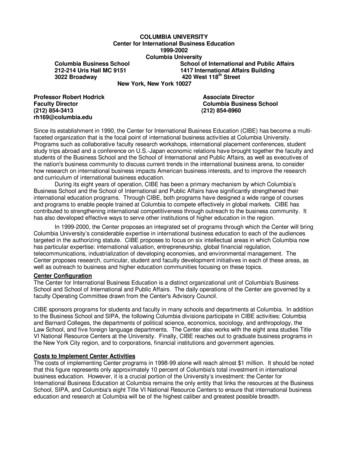
Transcription
COLUMBIA UNIVERSITYCenter for International Business Education1999-2002Columbia UniversityColumbia Business SchoolSchool of International and Public Affairs212-214 Uris Hall MC 91511417 International Affairs Building3022 Broadway420 West 118th StreetNew York, New York 10027Professor Robert HodrickFaculty Director(212) 854-3413rh169@columbia.eduAssociate DirectorColumbia Business School(212) 854-8960Since its establishment in 1990, the Center for International Business Education (CIBE) has become a multifaceted organization that is the focal point of international business activities at Columbia University.Programs such as collaborative faculty research workshops, international placement conferences, studentstudy trips abroad and a conference on U.S.-Japan economic relations have brought together the faculty andstudents of the Business School and the School of International and Public Affairs, as well as executives ofthe nation's business community to discuss current trends in the international business arena, to considerhow research on international business impacts American business interests, and to improve the researchand curriculum of international business education.During its eight years of operation, CIBE has been a primary mechanism by which Columbia’sBusiness School and the School of International and Public Affairs have significantly strengthened theirinternational education programs. Through CIBE, both programs have designed a wide range of coursesand programs to enable people trained at Columbia to compete effectively in global markets. CIBE hascontributed to strengthening international competitiveness through outreach to the business community. Ithas also developed effective ways to serve other institutions of higher education in the region.In 1999-2000, the Center proposes an integrated set of programs through which the Center will bringColumbia University’s considerable expertise in international business education to each of the audiencestargeted in the authorizing statute. CIBE proposes to focus on six intellectual areas in which Columbia nowhas particular expertise: international valuation, entrepreneurship, global financial regulation,telecommunications, industrialization of developing economies, and environmental management. TheCenter proposes research, curricular, student and faculty development initiatives in each of these areas, aswell as outreach to business and higher education communities focusing on these topics.Center ConfigurationThe Center for International Business Education is a distinct organizational unit of Columbia's BusinessSchool and School of International and Public Affairs. The daily operations of the Center are governed by afaculty Operating Committee drawn from the Center's Advisory Council.CIBE sponsors programs for students and faculty in many schools and departments at Columbia. In additionto the Business School and SIPA, the following Columbia divisions participate in CIBE activities: Columbiaand Barnard Colleges, the departments of political science, economics, sociology, and anthropology, theLaw School, and five foreign language departments. The Center also works with the eight area studies TitleVI National Resource Centers at the University. Finally, CIBE reaches out to graduate business programs inthe New York City region, and to corporations, financial institutions and government agencies.Costs to Implement Center ActivitiesThe costs of implementing Center programs in 1998-99 alone will reach almost 1 million. It should be notedthat this figure represents only approximately 10 percent of Columbia's total investment in internationalbusiness education. However, it is a crucial portion of the University’s investment: the Center forInternational Business Education at Columbia remains the only entity that links the resources at the BusinessSchool, SIPA, and Columbia's eight Title VI National Resource Centers to ensure that international businesseducation and research at Columbia will be of the highest caliber and greatest possible breadth.
Summary of 1999-2002 CIBE ActivitiesA.Curriculum DevelopmentOver the past eight years, CIBE has been a strong supporter of new course development and curriculuminnovation. During the 1999-2002 period, the Center proposes to further enhance this crucial area throughthe following programs.1. MBA Curriculum Development in Environment and Business. In 1998, two new joint appointments(Business School/Columbia Earth Institute) were made to the Business School that will enable its facultyto strengthen MBA curricular offerings on environment-related topics. This curriculum development willoccur in close consultation with CIBE faculty director Robert Hodrick.2. The MIA Degree: International Finance and Business Curriculum Review. The InternationalFinance and Business program in the School of International and Public Affairs focuses on the political,economic, regulatory, and cultural dimensions of business and finance, and integrates new courses insuch areas as emerging markets and privatization. The program will undergo a curriculum review byUniversity faculty in 1999.3. The MBA-MIA Dual Degrees. CIBE is the University entity with which the dual-degree students identifythemselves most strongly, and through which the students, faculty and administrations of the BusinessSchool and SIPA sponsor lectures, career and academic advising. CIBE will enhance advising servicesto dual degree students over the next three years, expand its orientation sessions, and continue topublish The Guide to the MBA-MIA Dual Degrees to all students who consider pursuing this track.4. Implementation of MBA Core Curriculum Revisions. Ongoing efforts to internationalize the MBAcore are overseen by the MBA International Business Subcommittee, composed of six senior faculty andchaired by Prof. Robert Hodrick. Its overall charge is to develop additional strategies for making theBusiness School’s international business program one of the best in the world. The subcommitteecurrently focuses on working with faculty to further globalize the core curriculum through the use ofinternational cases.5. Curriculum Development Awards. CIBE proposes to make course development awards to faculty atSIPA, the Business School and foreign language departments to create innovative courses for Columbiastudents. For the 1999-2002 funding cycle, preference will be given to faculty who propose to developcourses in the areas of international valuation, entrepreneurship, global financial regulations,industrializing developing economies, global information technology, and environmental managementwhen appropriate.B.Business Foreign Language InitiativeDuring the 1999-2002 funding cycle, CIBE proposes to expand its support of foreign language study,focusing on four areas:Intensive Commercial Foreign Language Courses. New courses will be offered in Russian andVietnamese and courses previously developed in Spanish, French, and Chinese will be continued.1. Excel Foreign Language Program. Additional language courses will be offered, based on a studentsurvey being conducted in 1998-99.2. Curriculum Development Grants to Language Instructors to develop new business courses taught inforeign languages.3. Collaborate with the University’s four Language House Programs (German, French, Italian, andSpanish) in developing new co-curricular programs on international business topics for their graduate,undergraduate, and faculty constituencies.C.International Business ResearchSince its establishment, CIBE has encouraged collaborative faculty research in international business,particularly among those from different disciplines. CIBE proposes the following research initiatives:1. Collaborative Faculty Research Grants. In the 1999-2002 funding period, the Center plans to awardresearch grants giving preference to collaborative efforts between international affairs and businessfaculty, particularly those relevant to the six topic areas of international valuation, entrepreneurship,global financial regulations, telecommunications, industrialization of developing economies, and the roleof environmental management in limiting and encouraging U.S. business expansion abroad.
2. Datastream International. In partnership with the Business School's Chazen Institute, CIBE willenhance its support of the maintenance and use of an international database called DatastreamInternational, significantly expanding access on Columbia campus networks, and increasing the numberof user orientation sessions. This database provides a complete range of on-line historical data, acrossall key financial instruments, to the securities industry worldwide. Datastream International is available toall faculty and students at the Business School and SIPA.3. Research Conferences on International Valuation. Three conferences on the valuation ofinternational projects will be held from spring 1999-spring 2001 to address the complex question ofdetermining the value of international projects. The first conference will analyze aspects of internationalfinance, focusing on the nature of equilibrium in international capital markets. Topics for otherconferences will be determined by the CIBE Advisory Council.4. Research Conference on Entrepreneurship. In collaboration with the Business School’sEntrepreneurship Program, CIBE will conduct a conference on small and medium-sized enterprises(SMEs) in transitional economies will be conducted in 2000-2001.5. Project on Global Financial Regulations. This new three-year CIBE project entails research projectsand policy discussions on the need for major reform of global financial institutions. Research projects ledby Profs. Charles Calomiris and Trevor Harris will track and document the process of re-designing theglobal financial system. A CIBE website will publish research reports and provide links to relevantprojects, publications, and organizations on the topic. Two CIBE conferences on global financial reformwill be co-sponsored with the Univ. of Illinois CIBER and the Federal Reserve Bank in Chicago (2000)and New York (2001).6. Research Conferences on Global Telecommunications. In partnership with the Columbia Institute forTele-Information (CITI) and Columbia’s Title VI National Resource Centers in East Asia and LatinAmerica/Iberia, CIBE will host conferences on Japan’s Telecommunications Agenda (1999), on DigitalCash and Electronic Money (2000), and Telecom Mergers and Joint Ventures (2001).7. Research Project on Industrialization of Developing Economies. In collaboration with Columbia’sNational Resource Centers in Latin America/Iberia, East Asia, and Western Europe, CIBE will support aresearch conference (spring 2000) and publication (2000-2002) from a network of scholars from 12institutions conducting comparative research on industrialization of developing economies in LatinAmerica, Southern Europe and parts of East Asia. The project explores theories and policy toolsappropriate to fostering industrialization in these regions.8. Conference on Environmental Management. As part of the university-wide effort to develop theColumbia Earth Institute, CIBE will co-sponsor with the Institute’s Program on Information andResources (PIR) in 2001 a conference on the role of environmental management in limiting andencouraging U.S. business expansion at home and abroad.9. Conference on Global Climate Agreements and International Competitiveness. Also incollaboration with the Earth Institute’s Program on Information and Resources (PIR), CIBE will conduct aconference in 2002 on the impact of climate change agreements on international competitiveness. Inparticular, the conference will examine plans to reduce global warming by taxing emissions and willconsider the impact on economic growth and international competitiveness of U.S. businesses.D.Student Study Abroad Opportunities1. International Exchange Programs. CIBE advocacy has contributed significantly to the increasednumber of MBA exchange agreements with leading graduate schools of business around the world.CIBE actively promotes these 22 programs to business students at Columbia, and will support theestablishment of 3 additional exchanges in 1999-2002.2. Student Overseas Study Tours. CIBE proposes continued support of student-initiated study tours tomany regions of the world. Participants visit businesses and factories and meet with governmentofficials, private-sector managers, entrepreneurs and local journalists. The tours enhance students'classroom experience by providing a first-hand look at the managerial, political and cultural norms thatshape a country's business practices. Faculty advisors accompany tour members and offer backgroundcourse work and on-site commentary on the management issues affecting a particular region. In 19992002, trips to China and Hong Kong, India, Japan, the Middle East, Eastern Europe, Vietnam, Thailand,Malaysia, West Africa and South America will be organized.3. MBA Enterprise Corps. The MBA Enterprise Corps enables selected second-year graduating studentsto participate in the management of new and expanding private enterprises in Central Europe. CIBE willremain involved in all aspects of this unique program through Associate Director of Career Services at
the Business School Judith Kostin, who will continue to serve as Corps Advisor and a member of theCorps' Board of Directors.4. Support for Summer Doctoral Research Abroad. In each year of the 1999-2002 funding period, CIBEwill support doctoral candidates in their summer research efforts overseas. Funding will be given tostudent whose dissertations address American competitiveness and/or other issues relating tointernational business, finance, management or communications. Upon their return, each doctoralstudent will present the result of their research to faculty and students in lecture format.In 1999-2002, CIBE will emphasize targeted outreach to other institutions of higher education, to U.S.corpora
(Business School/Columbia Earth Institute) were made to the Business School that will enable its faculty to strengthen MBA curricular offerings on environment-related topics. This curriculum development will occur in close consultation with CIBE faculty director Robert Hodrick. 2. The MIA Degree: International Finance and Business Curriculum Review.
